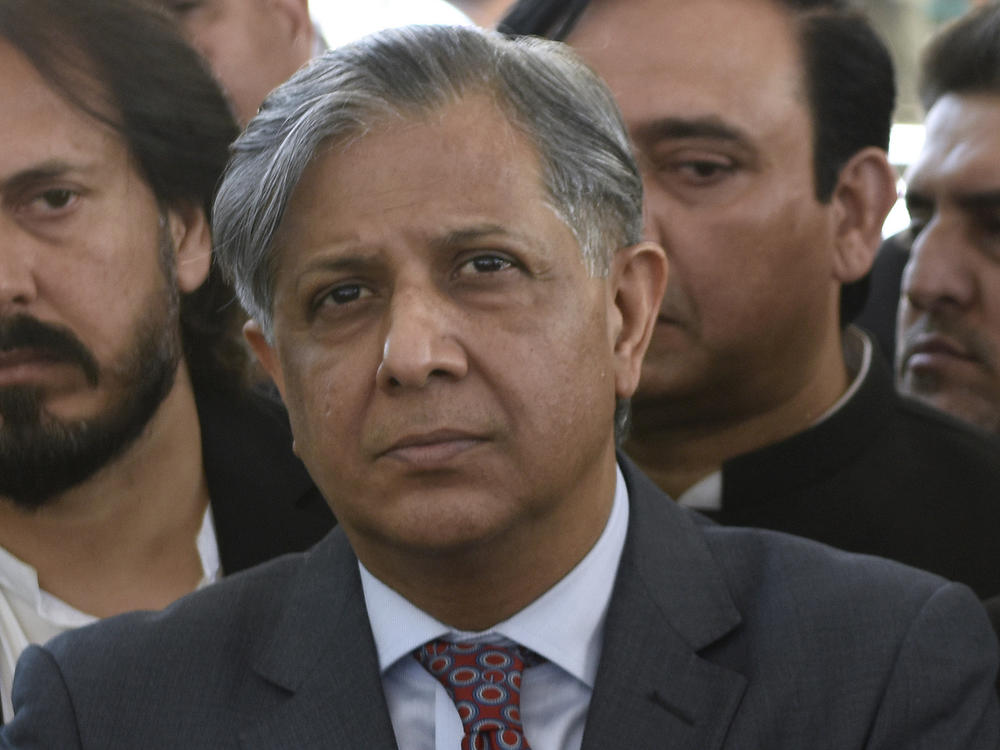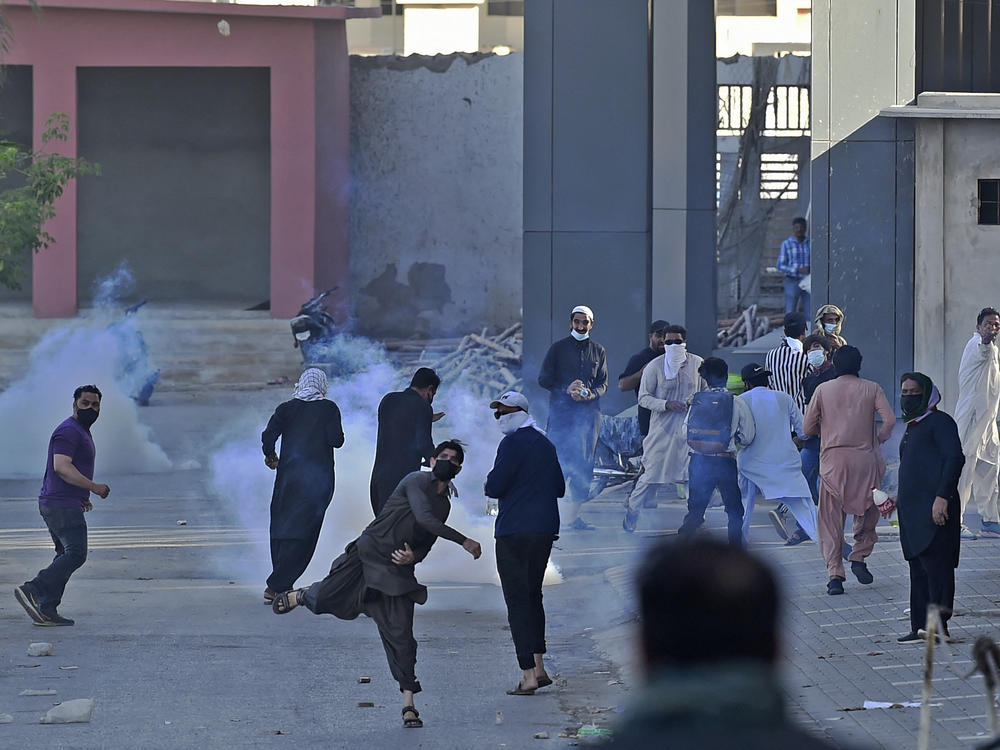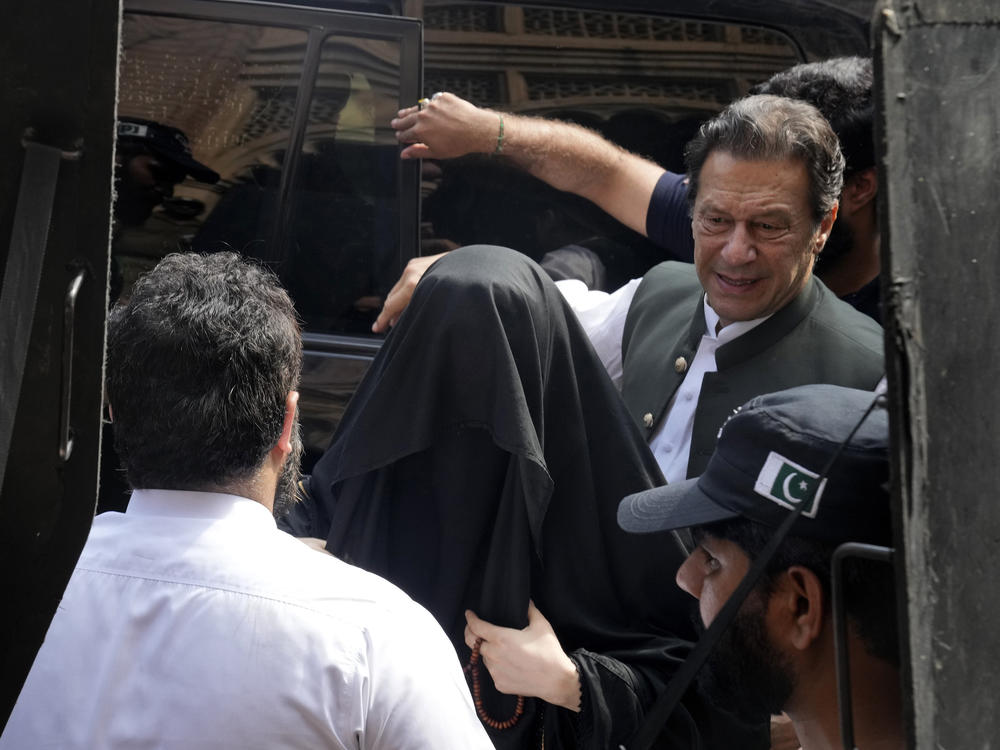Section Branding
Header Content
Pakistan's law minister defends putting protesters on trial in military courts
Primary Content
Pakistan's military has fired three senior army officers for failing to prevent violent attacks on military property by supporters of former Prime Minister Imran Khan. The military spokesman, Maj. Gen. Ahmad Sharif Chaudhry, announced the firings in a press conference on Monday, and said those sacked include a lieutenant general.
The announcement came as Pakistan continues to deal with fallout following last month's violent protests by thousands of Khan's supporters after Khan was arrested on graft charges on May 9 in Islamabad. They attacked military installations and set fire to the home of an army corps commander in the eastern city of Lahore. Khan was later released, though he still faces many charges.
Pakistan's law and justice minister is defending his government's decision to use an anti-terrorism law and military courts to try some civilians who were involved in the protests. Azam Nazeer Tarar tells NPR that he expects it will take "a few months" for the series of trials to complete.
Khan, who was ousted as prime minister in a no-confidence vote in parliament in April last year, has repeatedly accused the military of having pushed him out of power. Many demonstrators have said they joined the pro-Khan protests in May to express their frustration with the military, which is widely seen as controlling many aspects of Pakistani politics.
"It was not political protest," Tarar, who is also a senator with Pakistan's Pakistan Muslim League-Nawaz party, said in an interview with NPR during a visit to Washington on Friday. "Political protests never end up in causing human losses. ... At some places they used the petrol bombs ... They have been pouring fuel on the fires and setting ablaze the belongings and properties which they ransacked."
"Every jurisdiction has their own laws," Tarar continued. "[I]f a group of persons with criminal intent cause damage, while criminally trespassing into public property and set it ablaze, they commit arson. This would be an act of terrorism."
Tarar insisted that Pakistan's use of the anti-terrorism law is "fully compliant with international guarantees for free trial" and said those accused have the right to "engage counsel of their choice."
Human rights organizations say the law is misused to arrest and prosecute civilians accused of a range of crimes. A 2014 report by Justice Project Pakistan and Reprieve found that 10% of the country's death row inmates at the time had been tried as terrorists, and concluded: "The overuse and abuse of this Act is that whole swathes of defendants whose crimes bear no relation to terrorism have been sentenced to death following extremely unfair trials — whilst terrorist attacks continue unabated."
The military spokesman also said Monday that at least 102 people, whom he called "miscreants," were on trial in 17 military courts around the country, though on Tuesday, Pakistan's attorney general told the Supreme Court — which is hearing challenges to the trials — that they had not begun.
The U.S. State Department says it has continued to urge Pakistani authorities "to respect democratic principles and the rule of law for all people, as enshrined in the country's constitution." In a statement to NPR, a spokesperson said that issues such as human rights and democracy "remain a priority for the United States."
In The Nation, a Pakistani daily, Tarar offered a lengthy defense of his government's decision to use military courts to try civilians allegedly involved in attacks on military installations.
But human rights organizations have condemned the use of such courts to try civilians. Amnesty International said last month that it has "documented a catalogue of human right violations stemming from trying civilians in military courts in Pakistan, including flagrant disregard for due process, lack of transparency, coerced confessions, and executions after grossly unfair trials. Therefore, any indication that the trial of civilians could be held in military courts is incompatible with Pakistan's obligations under international human rights law."
Tarar told NPR that investigations into the former prime minister — who faces more than 100 criminal cases and charges including treason, corruption and murder — are still ongoing. "It will take a couple of weeks, I believe," he said.
Political and economic turmoil have persisted in Pakistan in recent months. The country's parliament on Sunday approved the latest budget in order to meet International Monetary Fund conditions for releasing new bailout funds. The previous bailout of $6.5 billion expires on June 30.
Copyright 2023 NPR. To see more, visit https://www.npr.org.



